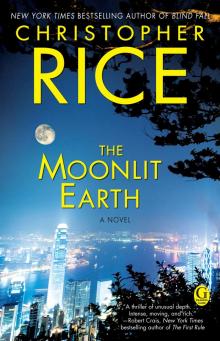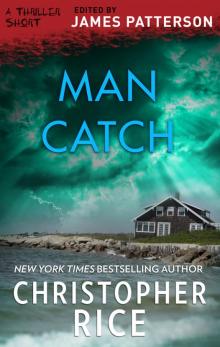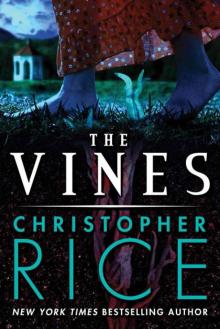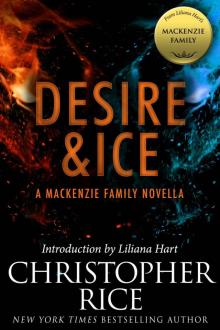- Home
- Christopher Rice
Bone Music Page 2
Bone Music Read online
Page 2
MODERATOR: Do we have another question?
AUDIENCE MEMBER 2: Yes, I . . . I mean, is it OK to ask about the movies, like, at all?
(Laughter.)
TP: No.
(More laughter.)
TP: No, I mean, whatever your question about the movies is, the answer’s no. No, I haven’t spent my life being stalked by the Bannings’ cannibal cousins. Because the Bannings weren’t cannibals, and they didn’t have any cousins. And, no, everyone I get close to isn’t horribly murdered.
AUDIENCE MEMBER 2: OK. But is it true you die in this one?
TP: Fingers crossed.
(Laughter. Some applause.)
LP: Trina, that’s enough. Why don’t we—
TP: Is it enough, though, Dad? Is it finally enough? Can we finally stop doing this every time a new movie comes out?
MODERATOR: OK. Now I’m confident that someone out there has some questions about the book, which presents some very valuable, if harrowing, lessons on how we can spot and avoid psychopaths who might seek to—
LP: Exactly. Why don’t we take one more question about the book, and then we’ll begin the book signing? There’s a hand up in the back, I think.
AUDIENCE MEMBER 3: So . . . um . . . Burning Girl.
TP: Don’t call me that.
AUDIENCE MEMBER 3: Excuse me?
TP: I said don’t call me that name.
(Crowd noises. Scattered boos.)
AUDIENCE MEMBER 3: I wasn’t going to call you that; I was just bringing it up as an example . . . OK. You know what? This is cute and all, like, this little display, I guess you’d call it. But you’ve been profiting off what happened to you for almost a decade now. I’m just wondering where all this self-righteousness comes from all of a sudden. Why are you upset now?
(Light applause.)
TP: I’ve been profiting? You do know I’m sixteen, right?
(Laughter.)
LP: OK. That’s enough. Look. Trina and I have devoted our lives to turning her terrible experience into a set of tools people can use to avoid falling prey to monsters like the Bannings. This is our life’s work. It always will be. Now, as I have said repeatedly, we can’t be held responsible for the creative license Hollywood takes with Trina’s story. We’re not producers on the Savage Woods films. We never granted script approval, so it simply isn’t—
TP: He gets a percentage of the gross. Do you guys know how that works? It’s a Hollywood thing—
LP: Trina!
TP: If they promise you a percentage of the net, you’ll never get anything because they’ve got accountants who can make it look like the movie never made a profit. But if you get part of the gross, you always get paid. He gets a part of the gross on every Savage Woods movie, including the one where I supposedly shoved someone in an incinerator. Where are you going, Dad?
(Lowell Pierce removes his microphone and leaves the stage.)
TP: It was supposed to be a miniseries, you see? Real fact based, true to life. But then they came to him and they said it would make a lot more money as a horror movie franchise. They could make them real cheap. They wouldn’t have to cast any stars. Maybe pump out a lot of sequels. And he said yes as long as they gave him a cut of the profits. As long as he could quit his job. Cheap torture porn about his own daughter. That’s his life’s work. And mine, too, apparently. Now, are there any other questions before I go vomit like I always do after these things?
AUDIENCE MEMBER 3: Yeah. I got one. Why are you such a bitch?
TP: I don’t know. Why are you a basement-dwelling psychopath who gets a boner watching women get tortured?
(Inaudible outburst. Sound equipment distortions. Security escorts Trina Pierce offstage.)
1
Jason Briffel reads the transcript again.
His hands are shaking. If anyone inside this roadside diner notices how badly he’s sweating, they’ll probably blame the baking desert heat outside.
But it’s not the heat.
It’s the same full-body reaction he experiences every time he reads the ten-year-old record of the last time Trina appeared onstage with her birth father.
Normally the transcript focuses him, which is why he picked it up after the plate of steak and eggs in front of him failed to ignite his appetite. He thought it would collect his scattered thoughts, channel his anxiety and doubt into action.
It’s been seven years since he showed up on the doorstep of her grandmother’s house in California, even longer since he mailed her those letters explaining how her birth father and her so-called rescue by the authorities had averted her true destiny. Her soul was being starved. Together, the two of them could reawaken that exceptional and enlightened young girl Daniel and Abigail Banning had coaxed into being.
But today the transcript hasn’t worked its usual magic. Reading it has left him angry and confused.
He’s gripped now by the humiliating memory of what happened to him that fateful night at Burnham College. He’s feeling the vise grip of the two blazer-clad security guards who’d appeared out of nowhere right after he entered the auditorium. The ones who’d threatened to call the cops as they carried him out so quickly he could practically feel the wind in his hair.
A hopeful, perhaps foolish part of him had been convinced that someone in Trina’s inner circle would have seen the wisdom in his letters.
Abigail Banning certainly had.
Unlike Trina, who responded to his attempts at honest communication with a restraining order, Abigail replied in great detail to every single letter Jason mailed her at Haddock Penitentiary. She recognized Jason as the vehicle for her adopted daughter’s restoration, a daughter who’d been divinely gifted to her and then cruelly removed by a world that did not understand the spiritual necessity of life taking. Abigail blessed Jason with words he’d been desperate to hear since he’d first laid eyes on Trina.
You will be the Daniel to her Abigail, she’d written. And in so doing, you will become my son, too.
Why hadn’t he read that letter instead of this transcript?
He’s brought it with him, along with several others. They’re at the bottom of his backpack, along with the coil of rope, the rolls of duct tape, and the Ziploc bags in which he plans to put the bullets he’s going to strip from the three different guns she keeps in her house.
Should he read it now?
No, there’s no telling what effect it might have on him.
Instead he searches the diner for corrupters. There’s one sitting a few tables away: pretty and young, with a blonde ponytail and a halter top that reveals just enough suntanned skin to corrupt. She taps at the screen of her smartphone. The mustached man sitting across from her gazes out at the passing eighteen-wheelers with a vacant stare that reveals all the damage she’s done to his soul.
She ignores the man on purpose. Jason knows this. That morning, or possibly the night before, she denied the man sex and took great, silent, delight in the pain this caused him. Right now she’s texting a girlfriend, or maybe several, and they’re reveling in the power she lords over the man, in the pain her withholding creates in him. And she does this because she is a corrupter, one of many. And once Jason has awakened Trina to their combined destiny, she will give herself entirely to their union and help him remove women like this blonde whore from the earth. Trina will burn away the evidence of his work, just like she burned away the detritus of Abigail and Daniel’s victims. But first he has to break down her walls, show her there’s no escape. From her true calling. From her real mother.
From him.
These thoughts, these plans—this vision—finally give him the confidence he’s been seeking since he stopped off at this diner.
He has only a few hours left in his drive, a few hours until he’ll reach the isolated parcel of Arizona desert she now calls home.
Today is a day like no other, and it will require a great deal more strength and confidence than it did to write those letters.
Because a few months a
go, all those years of not knowing where she’d disappeared to came to an abrupt end, thanks to a single miraculous e-mail. As thrilled as he’d been to have the information, the knowledge brought with it a distinct challenge: to return to the mission he’d almost given up on entirely—to stoke the flames that would turn Trina into Burning Girl once again.
As for the name she calls herself now, he must never let it pass through his lips. He would be doing her a disservice if he did. His job is to free her of her delusions, not strengthen them.
So he avoids thinking it now. To him, she will always be Trina Pierce. And if he succeeds this time, she will become his Burning Girl.
2
“Charlotte, why don’t you step away from the window?”
She knows it’s a good idea.
Most of Dr. Thorpe’s suggestions have been good ideas, or at least the 30 percent she’s been willing to try.
It’s true. If she doesn’t stop staring at the movie theater across the street, she won’t be able to focus on his advice. But a crazy part of her believes that if she turns her back on the bold cluster of words on the old-school marquee, they’ll somehow strike at her like a snake. They’re the same words that stopped her in her tracks when she first saw them, that have turned every night for the past two weeks into a prolonged battle with terrible dreams.
HALLOWEEN DOUBLE FEATURE—SAVAGE WOODS & SAVAGE WOODS II: THE RECKONING
The Blake is a restored movie house, one of the new jewels of Scarlet, this tiny, once-abandoned mining town in the Arizona desert turned hippie enclave and aspiring tourist trap. Its stucco facade is painted a shade of hunter green that from a distance makes it look like an oasis rising from the parched Sonoran desert. At night the vertical neon sign that spells out the theater’s name is visible for miles around.
At dusk, however, the sign looks skeletal and hungry; the unlit neon letters cast spidery shadows along its length. And then there are the posters flanking the ticket booth; the same blood-dripping art that used to stare back at her from the T-shirts worn by all those horror movie fans who’d pack the house at the events she used to do with her father.
“OK,” Dylan says. “Then describe what you’re seeing right now.”
“A movie theater,” she says.
“Is that all?”
“Invasion. Injustice.”
“Fear?” he asks.
“That, too. The girl on the poster looks very afraid, just like she always does.”
“The girl that’s supposed to be you.”
“Well, she doesn’t look like me. Her hair’s still brown, for one, and I’ve got about fifteen pounds on her. And they changed some of the letters in her name, so there’s that. One in the first, one in the last. My father saw to that part, you know, ’cause he’s such a kind, considerate, selfish, motherfu—sorry.”
“Since when did I say you couldn’t curse?”
“Well, if you had, I’d probably just do it anyway and then leave.”
“You’re free to leave at any time. You know that.”
“I do.”
“But I wish you wouldn’t, Charlotte. I wish you’d keep talking.”
“Honestly, it’s easier when you try to read my mind.”
She sits, looks at him for the first time since she stormed into his cramped office, which always smells of burned coffee from the AA meetings downstairs.
It’s not easy looking Dylan Thorpe in the eyes, and not just because he’s basically appointed himself her psychiatrist now. It’s hard because he’s one of the most astonishingly handsome men she’s ever seen. The kind of handsome that seems two-dimensional and unreal even when it’s sitting across from you, like it might slide from view if you swipe up on your phone.
Another woman, a woman without Charlotte’s walls, might have tried to seduce him after their first chat downstairs. Even after it became clear that he’d sought her out as a kind of pet project.
By his own admission, Dylan had sensed she didn’t truly belong in the AA meetings at the Saguaro Wellness Center. That she gravitated to them because there was something about the sharing—all those honest, unguarded expressions of hopes, insecurities, and fears—that quieted her soul, even though she’d never been what anyone would call an alcoholic.
It would take another few weeks before Charlotte admitted she liked the meetings because they made her feel close to her late grandmother, with whom she’d lived for almost a decade after fleeing her father.
They were both survivors, she and her grandmother. The woman almost drank herself to death following the disappearance of her daughter and grandchild. But even before Charlotte’s rescue—Trina’s rescue, if they were going to be technical about it—Luanne found sobriety and became a pillar of the small 12-step community in Altamira, a little town just south of Big Sur and a short drive inland from the Pacific Coast Highway, a place she’d called home for thirty years. After Charlotte went to live with her, Luanne made a habit of bringing her to the open AA meetings in town, the ones that allowed nonalcoholics to just sit and listen. That’s where Charlotte first heard slogans like “First things first,” “Easy does it,” and her personal favorite, “Keep it simple, stupid.” That’s where she had seen that people really could change. That we’re not all doomed by our genetics or our pasts.
The eight years she’d spent with her grandmother, three of them as an almost-normal high school student and the rest as an assistant manager in Luanne’s pet supply store, were the happiest in her entire life. Idyllic compared with what came before and after. The long walks they took together along Altamira’s rocky coast, the open skies that were often filled by great, towering clouds, the steadiness of her grandmother’s grip, and the quiet wisdom of her recovery, even the biting chill of the Pacific winds—all these things made her time on the Bannings’ farm seem like a memory so distant it might one day fade entirely.
Then one afternoon, walking home from the store, Grandma Luanne died of a sudden, massive heart attack, a quick and painless death, but one that tore a hole in Charlotte so deep she could barely speak for weeks afterward. This is what it means to have real family, she’d realized as they lowered the casket into the ground. This is part of loving and being loved, and without it, you cannot have the other parts, the joyful parts.
In her will Luanne left Charlotte her house and the small pet supply store she’d run for thirty years. Six months later, one of the big chains opened in the next valley over, close to the 101 freeway. Sales dropped precipitously. Her grandmother’s AA friends chipped in what they could, but it was obvious that even selling her grandmother’s house would not be enough to keep the store afloat.
When her father refused to help, Charlotte snapped.
Desperate, she decided it was time to demand at least a respectable portion of the money she’d earned for him over the years—something she could use to start a new life. And it was time to demand it with a lawyer.
She won, but with her victory came the sad realization that there was a lot less money saved than her father had led everyone to believe. Still, she got enough to pay for a legal name change and her house outside Scarlet.
In short, combined with the sale of her grandmother’s house, she managed to get just enough money out of him to become Charlotte Rowe.
In the three months since they started these chats, she’s shared all this with Dylan. She doesn’t harbor any delusions about him, about what their sessions mean to him. She’s just something rough and real for him to cut his teeth on after years of listening to big-city, high-paying clients whine about their perfect lives. And she’s fine with that. It keeps her safe, installs the kind of boundaries and structure her life has always lacked.
But still, there are moments, moments when the heroes in the Nora Roberts novels she reads before bed start to look like Dylan in her mind, or when her hands start to wander under the sheet as she wonders what things would be like if she wasn’t quite her and he wasn’t quite him and her past was someone else’s.
When she reminds herself that she’s just a hard-luck case, then Dylan’s good looks don’t inspire childish romantic fantasies in her. Instead his twinkling blue eyes, determined jaw, and short, jet-black hair, which he always keeps combed to one side like some TV dad from the 1950s, are just additional reminders that he’s passing through, while she plans to hide out here for as long as she can.
And it was all going so well, she thinks. Until the Blake decided to have a Halloween film festival.
“OK then. Well, is it safe to say you assumed that by moving to a town as small as Scarlet, you’d never have to look at that poster again?”
“Something like that, yeah. And technically, I don’t live here.”
“Your grocery store is here,” he answers. “And your PO box.”
“And you.”
“Exactly. So it’s got to feel as if they’re getting ready to play that movie just down the street from where you live, even though it’s a forty-five-minute drive.”
“Movies. Plural.”
“Exactly. Go deeper, Charley.”
It gives her a warm feeling the way he says even the shortened version of her new name. Charlotte is what her grandmother wanted to name her when she was born, and Rowe is the last name of a Canadian author who wrote a vampire novel her grandmother had loved.
“What does that mean, Dr. Thorpe?”
“It means you call me Dr. Thorpe when I ask you to do something you don’t want to do.”
“What are you asking me to do, Dylan?”
“Spell out how you feel, without judgment. So that we can walk you back to a healthier perspective together, one step at a time. “
“OK . . . I feel like the movies are a sign someone knows I’m here.”
“Even though you changed your name. Even though you live behind the kind of security system that’s usually used to protect bars of gold.”
“And the guns. Don’t forget about the guns.”
“The point, Charlotte, is that when I asked you to describe what you were seeing out the window, you used the word invasion.”
“Did I?”

 Blood Victory: A Burning Girl Thriller (The Burning Girl)
Blood Victory: A Burning Girl Thriller (The Burning Girl) The Surrender Gate: A Desire Exchange Novel
The Surrender Gate: A Desire Exchange Novel Blind Fall
Blind Fall Dance of Desire (1001 Dark Nights)
Dance of Desire (1001 Dark Nights) Kiss The Flame: A Desire Exchange Novella (1001 Dark Nights)
Kiss The Flame: A Desire Exchange Novella (1001 Dark Nights) The Moonlit Earth
The Moonlit Earth Light Before Day
Light Before Day Man Catch
Man Catch Bone Music
Bone Music Kiss The Flame_A Desire Exchange Novella
Kiss The Flame_A Desire Exchange Novella The Heavens Rise
The Heavens Rise The Vines
The Vines Desire & Ice: A MacKenzie Family Novella (The MacKenzie Family)
Desire & Ice: A MacKenzie Family Novella (The MacKenzie Family) The Flame: A Desire Exchange Novella (1001 Dark Nights)
The Flame: A Desire Exchange Novella (1001 Dark Nights) The Snow Garden
The Snow Garden